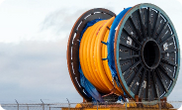Where is EPR/CPE used and what is it made of?

EPR and CPE are materials used in wiring construction. The materials provide cables with particular features that make them suitable for specific applications. Let’s see what EPR/CPE cables are and why these materials are beneficial for wiring.
What is EPR/CPE wire?
EPR/CPE cable is electrical wire with a CPE sheath and the insulation of which is made of EPR. Because of these materials, the wiring has great features that make it long-lasting and able to withstand diverse irritants. One can come across EPR/CPE cables that are known as tray, instrumentation, automotive or other types of cables.
EPR/CPE cables come in different constructions, so every customer can find one for their needs. There are EPR/CPE wires with multi conductors and pairs, as well as grounded wires. One can also find cables shielded with polyester or aluminum foil or unshielded ones. This wiring is rated at 600V, 90°C, and can be used in both dry and wet environments.
Where is EPR/CPE cable used?
With EPR and CPE, each material provides beneficial features, hence making the wiring versatile. Among all, CPE is most suitable for uses like industrial power plants, typically as control wires, and can be used as motor, coil and transformer lead cables. CPE cables can also be used as appliance wires.
As for the EPR material, insulation made of EPR can cover a wide range of system and environment needs where the wiring has to be installed. These include cases when distribution wires, feeders and high-voltage power supply are required. Also, EPR wires are often used as marine, mining, motor, power and device cables.
In addition, both materials allow using the wiring as submersible flexibles to the maximum depth of 100 meters.
What is EPR/CPE wire made of?
CPE stands for chlorinated polyethylene, which is a polymer and an affordable kind of polyethylene. The material has a rubbery texture, which adds flexibility and resistance to various weather conditions. Used for a jacket or sheath in the wiring, CPE provides excellent flame resistance as well as preserves the cable from heat, oils and oxidation.
EPR stands for ethylene propylene rubber, which is a copolymer and is also called elastomer. Mostly used for insulation, this material has great dielectric strength and is softer than rubber, hence providing more flexibility. EPR is also resistant to alkalis, acids, organic solvents, ozone, moistures and weathering.
What EPR/CPE cables can I buy at Nassau Cable?
Among the wide selection of electrical wiring, you can find EPR/CPE cables at our store. In the Nassau Cable catalog, you can find the following options:
- TYPE UL MV105 SHIELDED EPR INSULATION CPE JACKET 100% COPPER POWER CABLE 15KV
- MV-90 2.4KV SINGLE CONDUCTOR EPR/CPE UNSHIELDED POWER CABLE
If you have any questions on the wiring you’re looking for, feel free to reach out to our support team and get assistance.
















